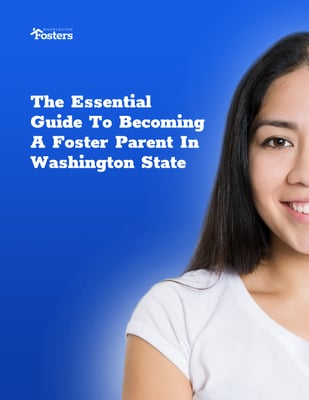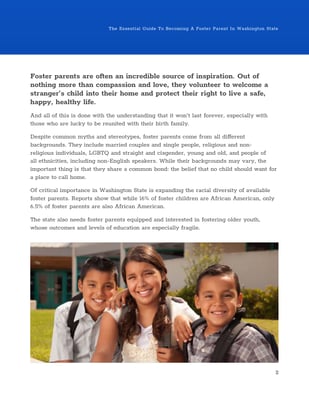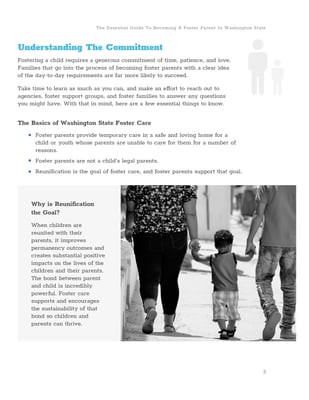We’re excited to release a new resource: The Essential Guide To Becoming A Foster Parent In Washington State.
Inside, you’ll find a comprehensive look at the steps required to become a foster parent in Washington State. We’ll talk about the unique needs of Washington State’s foster children, discuss things to consider before starting the licensing process, and provide a thorough review of the licensing process itself. You’ll also find resources dedicated to locating support groups and completing additional training.
The process of becoming a foster parent isn’t quick. But, the good news is, you’re not alone. Support groups, non-profit organizations, and other foster parents are ready to back you up. Inside, you’ll find out how.
Download now: The Essential Guide To Becoming A Foster Parent In Washington State

Want a preview of what’s inside? Here’s an example of what you’ll find.
Navigating The Licensing Process
In most cases, the foster care licensing process in Washington State takes 6–9 months. Families interested in foster care should plan on committing time to attend classes, complete required training, coordinate several assessment interviews, and have a home study completed. Below are the five main stages of the licensing process.
 1) Attend an Informational Meeting
1) Attend an Informational Meeting
Informational meetings are where you’ll learn more about the foster care system and how a particular agency works. Attending informational meetings is the best way to ensure you find the organization that’s best suited for your family.
At your informational meeting you can find out:
- Specifics about the application and licensing process
- Details about the importance of foster care in Washington State and your region
- Why reunification is the goal of foster care
- What support resources are available for foster families
- How you can support a foster family even if you don’t foster a child
The best thing you can do is to research several agencies in your area, make plans to attend informational meetings, and use those experiences to guide you toward choosing the agency that best supports you as a new foster family.
 2) Complete a Background Check
2) Complete a Background Check
The majority of private foster care agencies have their own application which contains several questions about your background, general information about your family, your home, and any issues that may impact licensing. In addition, all new foster families are required to complete a state agency application and a background check.
If you decide to switch agencies, you must start the agency and the state application process over.
Background Check Process
Your background check includes filling out a form that’s used to check for any history of arrests or criminal charges. In addition to your application, you are required to schedule an appointment to have your fingerprints recorded and cross-referenced with state records.
If your report includes any incidents, arrests, or criminal charges, you will receive additional documentation asking you to explain the situation in more detail.
Note that all members of your household, including anyone that will have regular access to the foster child, will need to complete a background check.
 3) Attend Caregiver Core Training
3) Attend Caregiver Core Training
This training is required to receive your foster parent license. The training gives you more information about being a foster parent and gives you strategies to help children and youth in foster care. The agency you are working with will give you specific information about Caregiver Core Training (CCT), each agency handles it slightly differently.
CCT provides new foster families with the critical skills and information they need to be a successful foster parents. Each agency’s CCT curriculum is slightly different, but you can expect to learn effective strategies for helping children within the foster care system.
Typical CCT includes lessons on:
- How the foster care system works
- Race, ethnicity, sexual orientation, and bias
- Early childhood development and behavior
- Considerations for working with children who have experienced trauma
- Legal proceedings regarding guardianship
- How to stay connected with a child’s biological parents
- Supporting and coping with the process of reunification
Some CCT training may also include a field study, where you visit with an active foster family and child in their home, and a coaching session, where you can get feedback and work one-on-one with an expert from your agency.
 4) Have Your Home Certified
4) Have Your Home Certified
Assessments include a series of interviews to learn more about you, your background, your parenting style, and your ability to handle the unique challenges of supporting a foster child.
Depending on your agency, you may be asked to participate in as little as 3 or as many as 10 interviews.
All agency assessments should include questions about your:
- Adult and childhood history
- Employment history
- Relationship history
- Financial stability
- Flexibility in scheduling and in providing care
- Support systems
- Understanding of the commitments of foster care
- Experience with trauma, loss, and grief
- Understanding of identity (racial, cultural, sexual orientation, gender identity, and gender expression)
For many new foster families, the assessment process is the most challenging, because it asks hard questions that you may not always feel comfortable sharing. Your agency should work with you to conduct your assessment in a way that makes you feel supported throughout the process.
As a part of your assessment, agency staff will also tour your home to ensure that it is a suitable environment for a child.
 5) Placement of Child
5) Placement of Child
Once you are licensed, you will begin to receive referrals for children in need of placement. As a part of that process, staff who have reviewed your home study will discuss the process of family matching, what you should expect, and you can best engage with your agency to support placement.
Your caseworker and/or Child Placement Coordinator acts as your point of contact for any referrals you receive. Referrals are tailored for your specific interests and abilities. In some cases, you may also offer to provide same-day emergent placements or subscribe to Facebook pages to monitor and request placement of children in need of a home in your area immediately.
Find out what else is involved in becoming a foster parent in Washington State today. Download your free resource: The Essential Guide To Becoming A Foster Parent In Washington State.








